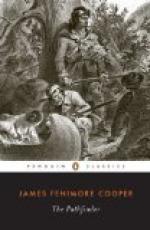regarded the more material points, and with a natural
discrimination that appeared to set education at defiance.
In short, a disbeliever in the ability of man to
distinguish between good and evil without the aid
of instruction, would have been staggered by the character
of this extraordinary inhabitant of the frontier.
His feelings appeared to possess the freshness and
nature of the forest in which he passed so much of
his time; and no casuist could have made clearer decisions
in matters relating to right and wrong; and yet he
was not without his prejudices, which, though few,
and colored by the character and usages of the individual,
were deep-rooted, and almost formed a part of his nature.
But the most striking feature about the moral organization
of Pathfinder was his beautiful and unerring sense
of justice. This noble trait — and
without it no man can be truly great, with it no man
other than respectable — probably had its
unseen influence on all who associated with him; for
the common and unprincipled brawler of the camp had
been known to return from an expedition made in his
company rebuked by his sentiments, softened by his
language, and improved by his example. As might
have been expected, with so elevated a quality his
fidelity was like the immovable rock; treachery in
him was classed among the things which are impossible;
and as he seldom retired before his enemies, so was
he never known, under any circumstances that admitted
of an alternative, to abandon a friend. The affinities
of such a character were, as a matter of course, those
of like for like. His associates and intimates,
though more or less determined by chance, were generally
of the highest order as to moral propensities; for
he appeared to possess a species of instinctive discrimination,
which led him, insensibly to himself, most probably,
to cling closest to those whose characters would best
reward his friendship. In short, it was said
of the Pathfinder, by one accustomed to study his
fellows, that he was a fair example of what a just-minded
and pure man might be, while untempted by unruly or
ambitious desires, and left to follow the bias of his
feelings, amid the solitary grandeur and ennobling
influences of a sublime nature; neither led aside
by the inducements which influence all to do evil
amid the incentives of civilization, nor forgetful
of the Almighty Being whose spirit pervades the wilderness
as well as the towns.
Such was the man whom Sergeant Dunham had selected as the husband of Mabel. In making this choice, he had not been as much governed by a clear and judicious view of the merits of the individual, perhaps, as by his own likings; still no one knew the Pathfinder so intimately as himself without always conceding to the honest guide a high place in his esteem on account of these very virtues. That his daughter could find any serious objections to the match the old soldier did not apprehend; while, on the other hand, he saw many advantages to himself in dim perspective, connected




